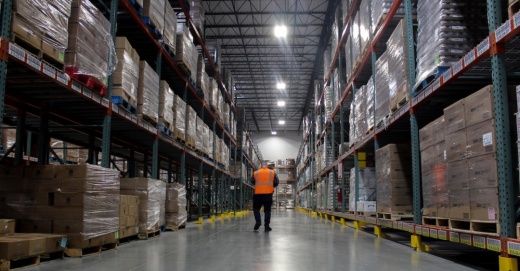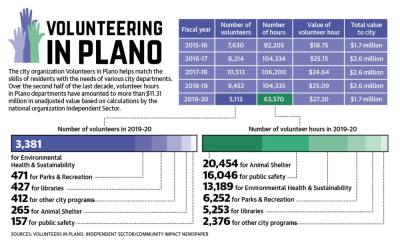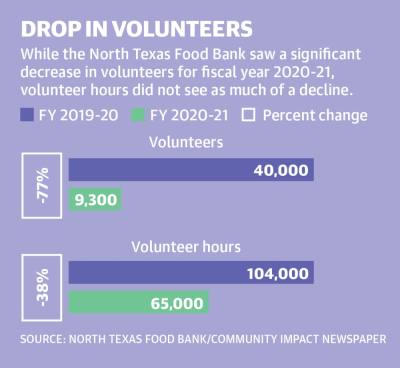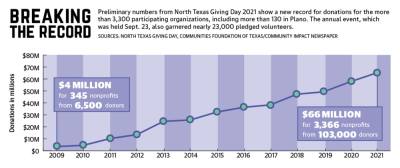Three separate deployments of the Texas Army National Guard and help from the organization Get Shift Done helped the food bank get through September of this year. Get Shift Done provides work for unemployed and underemployed hospitality workers. But with the holiday season quickly approaching, Collins said new volunteers are vital to helping the agency meet the needs of its clients.
“We desperately need in-person volunteers to come and help us sort, pack and do all of those [things the food bank] needs,” she said. “We need to be able to get out as much product as possible [in the coming weeks] so that everyone has a wonderful holiday season.”
A 2020 survey done by United Ways of Texas and the OneStar Foundation, in partnership with the Center for Nonprofits & Philanthropy at Texas A&M University, found that nearly 60% of nonprofits experienced severe decreases in volunteers due to COVID-19. Representatives from nonprofits throughout Plano said that drop continued in 2021.
Colleen Campbell, executive director of The Assistance Center of Collin County, said her agency has seen a more than 70% drop in volunteers.
“Nonprofits run on tight budgets, and if I have to pay someone [to assist with operations], that’s money I can’t [use to] help a client that’s in need,” Campbell said.
Working with less
The Assistance Center runs a weekday information referral helpline that connects those in need with local services. The agency also offers financial assistance programs and works to prevent homelessness. After operating with around 35 volunteers per week before the pandemic, Campbell said the organization now has fewer than 10 volunteers per week. And only half volunteer in person, she said.
“I had to revamp our phone system so our helpline could be done remotely,” Campbell said.
Hope’s Door New Beginning Center paused volunteer opportunities at the onset of the pandemic and shuttered its resale store for three months. However, the agency’s regular volunteers convinced CEO Christina Coultas to reopen the store to help Hope’s Door continue providing support services for survivors of domestic abuse.
“We had less volunteers in the last year but almost the same amount of volunteer hours,” Coultas said. “[That] was surprising—almost—because we felt we hadn’t had that many volunteer opportunities.”
About 20% of those who signed up to volunteer with the North Texas Food Bank in September did not show up, Collins said.
“That rate is usually pretty typical,” she said. “If you [are unable to fulfill] those reservations, ... let [the agency] know well enough in advance [so] that they can try and fill those spots.”
Volunteers in Plano saw around a 50% decrease in the volunteerism and service for city departments it coordinates among residents, Volunteer Resources Supervisor Corina Sadler said. A revamp of recruiting procedures has moved the city department closer to its pre-COVID-19 capacity of 10,000 volunteers per year, she said.
“There are so many people that want to help, and there’s always a need out there,” she said. “We love being able to connect people to a purpose.”
Increase in donations
The 13th annual North Texas Giving Day in September raised about $66 million, and nearly 23,000 volunteers signed up to help area nonprofits. Organized by the Communities Foundation of Texas, the online event has grown its pledged donation total each year since 2009, Director of Community Engagement Chris McSwain said.
“[North Texas Giving Day] really was developed to be a tool for our donors to have a database to find nonprofits,” she said. “We had no idea back then that it would grow into a movement.”
With the growth North Texas is experiencing as a region, McSwain is optimistic North Texas Giving Day can continue to grow in the years to come.
“[Last year] was tough, but 2021 has presented a new kind of tough,” she said. “There are a lot of groups who are ... getting smart and innovative with the way that they’re telling their true, authentic stories about what they need, and people are responding.”
Hope’s Door raised nearly $32,000 through North Texas Giving Day this year. Coultas said many of those who gave are not among the nonprofit’s typical donors.
“Those donors that are coming to our agency [through that event] are folks that online giving is their norm,” she said. “North Texas Giving Day has created an entry point for them to learn more about the agency and do more.”
To celebrate its 30th anniversary of helping survivors of child abuse or neglect navigate the legal system, Court Appointed Special Advocates of Collin County held an in-person gala in October that was attended by about 350 people. Executive Director Tricia Clifton said that was a very different event from the virtual 2020 gala.
“Sponsorships and [funds raised] went directly back to our program because our expenses were decreased tremendously because we didn’t have an in-person event,” she said.
Clifton said CASA also switched much of its training and volunteer opportunities to online, which helped keep the agency from losing any of its volunteer advocates.
“We knew that it was incredibly important to make sure that we still maintained a big enough volunteer pool that we were able to continue serving 100% of the children that come into the foster care system in Collin County,” she said.
The Assistance Center also saw a rise in donations last year, but that has tapered off in 2021, Campbell said.
“Now [that] we’re in year two [of the pandemic], I think a lot of people who are not as close to it think that maybe people aren’t in need as much,” she said. “But we are still seeing a great need for assistance.”
Biggest needs
Many nonprofits in and around Plano are preparing for increased need during the holiday season.
CASA of Collin County has seen its case numbers increase every month since June.
“Holidays are stressful for anyone and everyone,” she said. “If you combine the effects of COVID[-19], the economy, job loss, et cetera, we know that even the rest of this year is probably going to be worse.”
At Hope’s Door, Coultas said the general increase to cost of living in North Texas means the agency’s clients are in need of things as simple as gas cards.
“[Many of our clients need] that $5 in the gas tank to get to work,” she said.
Campbell said significant demand also remains for The Assistance Center’s services, despite people returning to work.
“People that are working are not getting the hours that they were making prior to [the pandemic], so they’re still in need of help with their rent and utilities,” she said. “We’re seeing families get evicted. That’s not something that we want to see, ever.”








